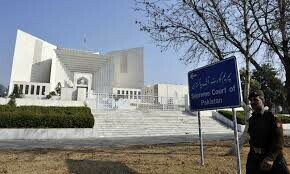MUZAFFARABAD: The Azad Kashmir Supreme Court declared on Wednesday that Section 3 of the AJK Shariat Court Act 1993 was partly ultra vires of the AJK Interim Constitution and, therefore, all Shariat Court judges appointed since 1993 under this provision were void.
As a result of what the legal fraternity here termed a landmark judgment, three Shariat Court judges — Hussain Mazhar Kaleem (appointed in late 1990s) and Sardar Shehzad Khan and Mohammad Mushtaq Chaudhry (appointed in November 2012) – ceased to hold their offices.
However, all functions performed by these judges were declared valid on the principle of de facto doctrine, including the drawing of financial benefits, etc.
The judgment was announced by a full court headed by Chief Justice Mohammad Azam Khan on two civil appeals against a Dec 4, 2013 verdict by the AJK High Court and a review petition against the April 4, 2014 apex court order.
“For establishment of the Shariat Court in accordance with the spirit of the constitution (and) for achieving the objectives mentioned in the Shariat Court Act 1993, legislation having certain features is required,” the apex court held.
Appointment of all three judges nullified
Listing the features, it said there must be a provision for induction of at least one Aalim Judge, possibly having the qualification of being close to Mujtahid or at least the qualification provided under Article 203-C of the Constitution of Pakistan i.e. having at least 15 years of experience in the Islamic law, research or instruction; the mode of appointment of judges in consultation with the AJK Supreme Court chief justice and the AJK High Court chief justice (who also happens to be the chief justice of Shariat Court); and providing mode of removal of a judge of the Shariat Court for misconduct, incapability of properly performing functions or duties by reason of physical or mental incapacity.
The apex court further held that keeping in view the status of the Shariat Court with relevance to the scope of jurisdiction its establishment should be provided through an amendment to the Interim Constitution. However, if for the time being the required amendment was not practicable for any reason, the objective could be achieved through a sub-constitutional legislation incorporating the features as directed by the court.
The apex court observed that the present composition of the Shariat Court appeared to be superfluous because there were no special features, qualification or distinction in its composition except the mode of appointment of its judges.
“Such arbitrary mode, which practically amounts to adopting a mechanism of bypassing the constitutional provisions providing the consultation with the chief justices, is one of the reasons for creating doubts in the minds of the public at large regarding the establishment of such a court for accommodation of favourites,” it said, adding that any law which was against the independence of judiciary amounted to curtailing the constitutionally guaranteed fundamental rights.
The court was conscious of the fact that implementation of the judgment would create a vacuum and affect the interest of the litigants. “Therefore, the government and other authorities concerned are directed to immediately appoint, under proviso of subsection 2 of section 3 of Shariat Court Act, 1993, judges of the high court as judges of the Shariat Court.”
The verdict said the number of judges should be determined in the consultation with the Shariat Court chief justice.
Published in Dawn, September 18th , 2014
















































Dear visitor, the comments section is undergoing an overhaul and will return soon.